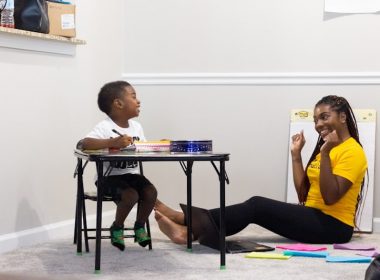The Latest
April 25, 2024
Searching for vintage girl names to grace your little miss? Just as I’ve turned to classic…
Have you ever considered the educational benefits your children can gain from traveling the…
Many mothers worry that their husbands are too hard on their kids or that they are…
Kids' Play
Whether we engage our kids and set up invitations to play or just leave them to their own…
Motherhood
Meaningful lessons learned through experience. Dive into a collection of posts that provide…
Reviews
Explore our comprehensive reviews that help you make informed decisions on the best gear,…
School
From academic tips to strategies for fostering a love of learning, explore a wealth of…
Newsletter

Sign up for our newsletter
Get notified of the latest parenting news, advice, and resources.















![Parenting a strong-willed, sensitive child is challenging. We want to preserve their spirit while effectively parenting them. This is how to work with your child's temperament and improve cooperation. My first strong-willed, sensitive child was my daughter. Shortly after she was born, many described my baby girl as an old soul. As an infant, her eyes were wide with curiosity. With a serious expression on her face, it was as if she was analyzing everything. As an infant, she was a happy baby. However, she got overstimulated easily and was quick to let me know when I needed to take her out of a crowded room. Her first day of preschool was another example of how her personality plays out. She had her backpack ready days before the first day of school. Once she was packed, she was furious she couldn't go to school that instant. When the first day of school came, she lept with joy. When we pulled into the parking lot, she told me to wait in the car and let her walk in on her own. Considering the fact she was three and not thirteen, the answer to that demand has a hard no. I did my best to keep with my two-year-old son on my hip as my little girl burst through the rusty red school doors. In the classroom, her whirlwind of excitement came to a screeching halt as she saw another girl crying. My daughter's desire to leave me in the dust tapered. Her big brown eyes got even darker as the empathy she felt for the girl washed over her. "She's sad, Mama." My daughter didn't know how to reconcile the dissonant emotions. She was excited to leave me while another child was brokenhearted that her mom had left. Thankfully, this situation acted as an opportunity for both girls to make a friend before class started. (They felt the cloakroom holding hands and were best friends for the rest of the school year.) This example of the juxtaposition of my daughter's strong-will and sensitivity is one of many. But my son is also highly sensitive and willful. Because of this, our days are punctuated by headstrong and emotional reactions. For example, when a soccer game got too rough, my son made his way to the sidelines, crossed his arms, and refused to get back on the field. And, the other day, decided to set up a lemonade stand, they went toe-to-toe over whether or not a lemonade stand can carry drinks other than lemonade. They argued about the best place to set up the stand. And, when no one came to their sale, they were both crestfallen. Related reading: Parenting a Strong-Willed Child? These are the best books to increase cooperation Parenting a strong-willed, sensitive child is challenging. If you can relate to examples like these, chances are you find parenting your child to be dynamic and, at times, exhausting. There is no autopilot for parenting these precocious and emotional souls. This is because strong-willed children take nothing at face value. They are forever trying to determine what the boundaries are and will always try to negotiate. Furthermore, these children are acutely aware of changes in their environment, have big hearts, and equally big emotional reactions. So often, children of this nature pick battles or are devastated over things like: being served big carrots you cut for them instead of mini carrots, you suggesting they wear a pair of pants that "feel funny," a change in plans, like having to wait to go to the aquarium because the baby hasn't woken from his nap. The good news. Strong-willed, sensitive children are naturally equipped with some of the greatest predictors of lifelong success. For one, they are naturally tenacious. When a strong-willed child doesn't get her way, she brainstorms, negotiates, and presses the issue. For instance, when their lemonade stand failed, my children eventually decided to add more items, a price list, and find a higher traffic location (they set up right near a construction site.) As a result, they both came home happy, clenching about $3 in change each. In addition to grit, these children are more inclined to be leaders and stand up for what's right. Laura Markham, clinical psychologist at Columbia University explains, [Strong-willed children] are usually self-motivated and inner-directed, and often grow into leaders as adults. They are more impervious to peer pressure and go after what they want with more gusto. They want to “learn things for themselves rather than accepting what others say, so they test the limits over and over,” and this relates to relationships as well. Such discernment involves not only when they cut their hair, eat vegetables, or choose to wear a coat, but also in whom they decide to trust and in whom they choose to follow or who they allow themselves to be influenced by. Finally, emotionally intelligent people tend to have better job performance (1). And, highly sensitive people tend to be empathetic, smart, and contentious (2). How do you know you have a strong-willed, sensitive child? Children who have strong-willed temperaments tend to: be prone to power struggles, question authority and rules, be bright and persistent, frequently test authority figures (parents, babysitters, substitute teachers, extended family) to see determine what the boundaries are, protest readily when expectations seem unfair, carry arguments on for longer and farther than one would anticipate (3). Children who are highly sensitive tend to: be very intuitive, learn better with gentle correction rather than harsh punishment, notice when others are bothered or upset, feel emotions deeply, picks up on subtle changes (such as the "slightest unusual odour") asks a lot of questions, is very sensitive to pain. You can take the Highly Sensitive Child test, developed based Dr Elaine Aron's research, here. As an Amazon associate, I earn from qualifying purchases. 5 key strategies that make parenting a strong-willed, sensitive child easier. Frame your child's behaviour. By understanding your strong-willed, sensitive child, you have context for your child's behaviour and are better equipped to coach it. Work with your child's personality by establishing the family rules together. Call a family meeting and discuss problems as well as goals. Prompt your children to talk about what rules they think are reasonable as well as how they should be reminded when mistakes are made. In this situation, you are still the parent and you are guiding the discussion while collaborating to accomplish peace and cooperation in your household. Frontload as often as possible. This means to look for every chance to give your child a heads-up before disappointment strikes, plans change, or the going gets tough. This will make it so much easier for her to be resilient when she feels challenged. Make boundaries firm and discipline gentle. Strong-willed children need to know what rules are non-negotiable. This minimizes power struggles and also facilitates confidence in a child. Research shows that sensitive children feel the most vulnerable when boundaries aren't clear (3). Equally, discipline must be calm and gentle. Studies on sensitive children show that they hold themselves highly accountable for their mistakes (4). In cases of misbehaviour, the best approach is a subtle reminder or in more extreme cases a timeout where you're with your child. When appropriate and with your child's permission, explain your child's temperament to others. Some may mistakenly think your child is intentionally being too sensitive or strong-willed. Others may not know how to make sense of your child's nature. By giving context to who your child is, the adults in your child's life will be better equipped to take care of and guide him. A final note on sensitive and strong-willed children Strong-willed, sensitive children require patience and consideration. They aren't easy to raise, but their temperament gives them the innate capacity to become compassionate and meaningful leaders. The key is to work with their personality while increasing cooperation. To do so, the adults in their lives must work with them instead of against them, be clear with their expectations but gentle with their discipline, and act as their advocate where appropriate. In doing so, adults are able to guide the child in a way that celebrates who she is. This then gives the child to truly become the person she is meant to be.](https://parentfromheart.com/wp-content/uploads/2016/03/strong-willed-child-upset.jpg)






























